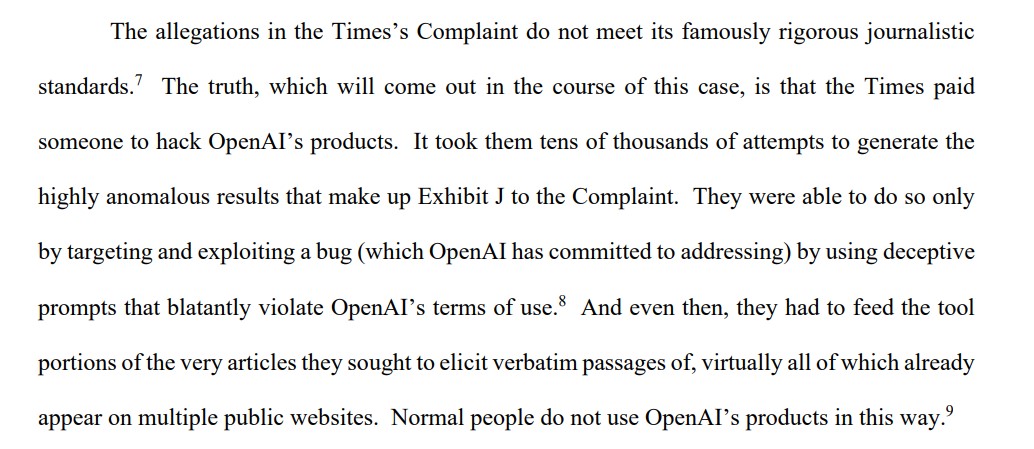From Torrent Freak:
OpenAI accuses The New York Times of paying someone to hack OpenAI’s products. This was allegedly done to gather evidence for the copyright infringement complaint the newspaper filed late last year. This lawsuit fails to meet The Times’ “famously rigorous journalistic standards,” the defense argues, asking the New York federal court to dismiss it in part.
In recent months, rightsholders of all ilks have filed lawsuits against companies that develop AI models.
The list includes record labels, individual authors, visual artists, and more recently the New York Times. These rightsholders all object to the presumed use of their work without proper compensation.
A few hours ago, OpenAI responded to The New York Times complaint, asking the federal court to dismiss several key claims. Not just that, the defendants fire back with some rather damning allegations of their own.
OpenAI’s motion directly challenges the Times’s journalistic values, putting the company’s truthfulness in doubt. The notion that ChatGPT can be used as a substitute for a newspaper subscription is overblown, they counter.
. . . .
“In the real world, people do not use ChatGPT or any other OpenAI product for that purpose. Nor could they. In the ordinary course, one cannot use ChatGPT to serve up Times articles at will,” the motion to dismiss reads.
‘NYT Paid Someone to Hack OpenAI’?
In its complaint, the Times did show evidence that OpenAI’s GPT-4 model was able to supposedly generate several paragraphs that matched content from its articles. However, that is not the full truth, OpenAI notes, suggesting that the newspaper crossed a line by hacking OpenAI products.
“The allegations in the Times’s complaint do not meet its famously rigorous journalistic standards. The truth, which will come out in the course of this case, is that the Times paid someone to hack OpenAI’s products,” the motion to dismiss explains.
OpenAI believes that it took tens of thousands of attempts to get ChatGPT to produce the controversial output that’s the basis of this lawsuit. This is not how normal people interact with its service, it notes.
It also shared some additional details on how this alleged ‘hack’ was carried out by this third-party.
“They were able to do so only by targeting and exploiting a bug […] by using deceptive prompts that blatantly violate OpenAI’s terms of use. And even then, they had to feed the tool portions of the very articles they sought to elicit verbatim passages of, virtually all of which already appear on multiple public websites.”
Link to the rest at Torrent Freak
PG notes that allegations made in lawsuits may or may not be true. Only when a court issues a final verdict can anyone know what was true and provable and what was not.